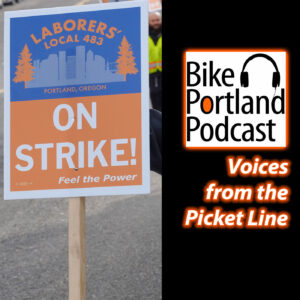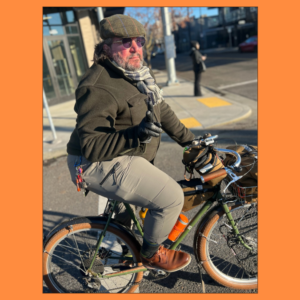What do we want to see in the next leader of the Portland Bureau of Transportation?
Why is this hire so important for the agency?
What were previous PBOT directors like and why does that matter?
These are some of the questions my co-host Kiel Johnson and I had on the latest episode of our podcast.
Last week, Kiel messaged me and said, “What are your thoughts on the PBOT director position?” I get messages like that all the time from local transportation activists and insiders. Typically we end up having a good conversation on the phone or on the side of an event. But since I’ve had a more audio-oriented mindset with BikePortland, I’ve wanted to share these conversations with you. So I invited Kiel over to the Shed and we recorded it.
This episode is different than we’ve had in the past. It’s more of an informal chat. It’s really just two old friends talking about something they both care about a lot. Hope you enjoy eavesdropping! And if you have thoughts about what you’d like to see in the next PBOT director, let’s hear them. We hope candidates for the job — and maybe even the folks that will make the hire! — will read this post and listen to this episode.
Find this episode on Apple Podcasts or wherever you listen.







Thanks for reading.
BikePortland has served this community with independent community journalism since 2005. We rely on subscriptions from readers like you to survive. Your financial support is vital in keeping this valuable resource alive and well.
Please subscribe today to strengthen and expand our work.
This is a great conversation!
Thanks Lisa. Glad you liked it. By the way, anything you want to talk about? I think some of the conversations you and I have would be fun to share on the podcast.
Sue Kiel was an administrator from BES before she was appointed to PBOT. Tom Miller knew when he was appointed that he was temporary. Toby whose last name I forget was next, followed by Leah Treat. During the interviews in which Leah was eventually hired, it was explained to each candidate that the PBOT director does not have the ability to control policy, the budget, hire or fire personnel, nor the politicians – their biggest role is as the chief cheerleader for the organization.
PBOT is run and dominated by a small group of highly-trained and experienced civil engineers who cannot be fired. Whoever holds the purse strings runs the bureau, and that ain’t the city council.
Wow, so much misinformation here.
The Director has a ton of influence on policy and overall direction of the agency, they are primarily responsible for the budget, they do most of the hiring and firing, etc. The Commissioner only has power over selecting the director, they don’t do any other hiring or firing and they only play an oversight role over policy and budget.
The idea that a secret cabal of civil engineers runs the bureau is a ridiculous notion. PBOT would be a very different agency if that were true.
Atreus, I don’t know who you are nor do I really care, but judging from your writing style you’ve been contributing to this blog for many years under various pseudonyms, and of course JM knows precisely who you are and seems happy to keep your identity under wraps.
I am curious though, since you seem to be so closely in tune with the city, either as a current or as a former employee, what positive aspects you hope for in the next PBOT director, with the understanding it will be the new city administrator who will be able to hire or fire her, their or him?
Au contraire, civil engineers actually do have an undue amount of influence and control in all three infrastructure bureaus – PBOT, BES and PWB. There are many civil engineers in upper and mid management positions in all three Bureaus and they do exert a very high level of influence over both Bureau policy and budget.
And commissioners have as much power as they are willing to exert; for example, both Erik Sten and Randy Leonard turned the Water Bureau upside down implementing their personal agendas during the time each was commissioner in charge at PWB.
BTW, my guess is that Atreus is a new pseudonym for paikiala.
Is that how you imagine it works, David? I imagine it works differently now than it used to…
Atreus & Serenity, whoever you are, you will of course continue to believe whatever you want to believe, no matter which color pill you take…
My response to the podcast is based on what I saw when I’ve talked with these various directors – I’ve actually met with Rhoads (Sue’s predecessor), Sue Kiel, Tom Miller, that Toby guy (a PBOT insider), and Leah Treat and saw their influence within PBOT (or a lack of it) first-hand through the budget committee. I don’t know the outgoing guy – I’m sure I met him before he worked for PBOT, but not after. In each case, their influence on overall PBOT policy was nil – they generally left that sort of thing to their underlings and to the Mayor (their boss). All of the directors where what JM was calling “operational” types with the exception of Tom Miller who had difficulty doing operational type stuff.
The most momentous changes to city bike policy in the city came about when the person at the top, the Mayor, wanted changes – leadership like Bud Clark and Sam Adams. Everything else has been a long slow slide towards mundane mediocrity – you can see that in the bike usage rates. The bike infrastructure budget was never more than $1.5 million in any given year, less than 5% of the capital budget, and the Active Transportation group while numerous, was never well-paid and thus formed a rather small part of the operations budget. And that was a brief period under Sam Adams – those glory days are long gone – and as long as you keep electing mediocre barely competent mayors and blah city councils, you will never see those days again.
Which is not only a pity, but a bit of a national disaster. You may not know it or believe it, but Portland’s influence for the nation is not because the city is so great – it isn’t at all, weird as it is – but because it is so typically mediocre and yet has a high bike usage rate, the type of city that other cities nationwide might be able to imitate. And so if somehow Portland is able to get to a 25% bike/ped usage rate, other mediocre cities nationwide with 0.2% usage rates will likely try their best to imitate Portland. And so it’s in my best interest as a bike advocate in my current mediocre city of Greensboro NC to do my level best to get Portland back on track.
When we hired Leah Treat, I was on the panel that reduced the number of candidates from six to three (we had to eliminate 3), I was representing “the public”.
We eliminated two from PBOT and one from ODOT, qualified but not even remotely as good as the top 3. Our #3 guy was from Wisconsin DOT, African-American, very good at dealing with layoffs and finding jobs for them. Leah was #2, a good administrator from DC and Chicago. Our number #1 candidate turned us down – he was very very good, had a real vision and had dynamic leadership abilities, a rare person.
We need a bold Director, with bold vision.
People don’t tend to hire their betters for subordinate positions so we will continue to be stuck with mediocre Bureau leaders and managers.
Someone who will:
Good discussion, but I do want to offer one suggestion. Instead of limiting the City to either a local option or a national option, why don’t we expand the circle a little bigger and consider international options? Are there really that many American cities we think are worth emulating at this point?
There are plenty of similar sized cities in Europe that have much higher rates of non-auto transportation. My understanding is that Canadian and Mexican cities also tend to have higher public transit usage rates than American cities of similar size.
It seems like as a society we are pretty bad at actually creating cities for biking, walking, and transit. Why not look for someone from a place that has a proven track record of doing those things better? Seems like there’s plenty we could learn.
We need a change in paradigm and, in turn, cultural evolution in Portland and throughout the United States. Car culture has run amok and is destroying what social fabric exists. I hear and see people windshield perspectives constantly. We’re all inundated with car-centric thinking everywhere we turn. So, of course, people being people (ie, generally followers) the commonest way to move about is with a car. Those of us who *choose* to get around without a car are otherized and those who have no other options are effectively erased by society.
We need our “leaders” to step up, make difficult decisions, talk about the imperatives and actually implement policies that will help *people*. You two touched on all of these things. Great conversation. Thank you!